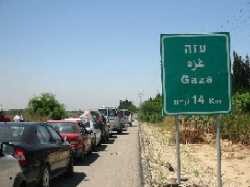27 May 2003

Convoy on its way to Gaza
Captain Levy received the letter and invited all participants to enter Erez saying that internationals are able to pass as normal and have been able to do so for the last week. Several of the agencies present had tried to access Gaza in the last week and had not found the situation to be so. There was no mention made by Captain Levy as to whether people would be required to sign and waive the responsibility of the IDF should anything happen to them. There was also no guarantee that those passing into Gaza would be allowed to get out again.
A group of Palestinian staff from UPMRC and members of Physicians for Human Rights with Israeli citizenship then attempted to gain entry. They were told that under no condition would access be given to them. This highlights the long term difficulties both Palestinian and Israeli humanitarian workers have had over the last two years.

International aid workers at Erez checkpoint
After some discussion as to whether to enter and having seen that this move was a likely reaction to the attention of the world media, the organizations present decided not to attempt to gain entry.
Further actions planned include taking on Captain Levy’s invitation and several organizations will attempt to gain entry in the course of the next few days. AIDA will monitor what happens and keep everyone informed.
National and international media attended the event. There was TV coverage from Al Jazeera and Israeli Channel 10. Press coverage from Yedioth Aharonoth, Haaretz, Jerusalem Post, National Catholic Register, Catholic News Service, El Pais (Spain), Catalonia Radio, several other journalists from Dutch, Swiss and Italian media as well as other religious media groups.
AIDA calls for free and unrestricted movement for all humanitarian and development workers

If the current situation is not resolved soon, the 41 International Non-Government Organizations (INGOs) with humanitarian aid and development programs in the Gaza Strip may be forced to cease their activities, adding to the deteriorating humanitarian situation for the 1.2 million Palestinians living there. Two organizations have already been forced to stop operations altogether. For those still trying to work, their staff inside are unable to leave either for work or personal reasons, staff are unable to enter Gaza to provide support to their projects and as a result, all are facing considerable difficulty in carrying out their activities.
The undersigned humanitarian aid and development organizations find these restrictions unacceptable since they contravene applicable international law, to which the Government of Israel is a signatory.
Furthermore, we are aware that, as of May 17th, the Israeli authorities have compiled a list of individuals who will be allowed access to the Gaza Strip. This list includes certain staff of the UN and some humanitarian and development INGOs. We see this list as an additional measure to impede and restrict the access of humanitarian aid and development organizations to their project sites and as severely hindering the delivery of humanitarian relief.
These measures are contributing to the overall erosion in the ability of humanitarian aid and development organizations to provide assistance to the Palestinian people. Many organizations have been forced to spend up to 50% of their working hours dealing with the growing restrictions. These have included time spent at checkpoints trying to gain access to project sites in the Gaza Strip, filing access requests, complaints and other liaison with the Israeli authorities and the international community on their continued inability to undertake their work in any kind of consistent or effective manner.
The undersigned humanitarian aid and development organizations call on the Government of Israel to immediately lift the restrictions imposed on the Gaza Strip and facilitate humanitarian aid and development work by providing full and unrestricted access to all.
Signatories:
Accion contra el Hambre (ACH); ANERA; Asamblea de Cooperacion por la Paz (ACPP); Caritas-Jerusalem; Centro Regionale d’Inter-Vento per la Cooperazione (CRIC); Comitato Internazionale per lo Sviluppo dei Popoli (CISP); DIAKONIA; Gruppo di Volontariato Civile (GVC); International Christian Committee; Medecins du Monde France; Medecins du Monde – Greece; MSF – Greece; MAP UK; Mennonite Central Committee; Mercy Corps West Bank; Movimiento por la Paz, el Desarme y la Libertad; MOVIMONDO Italy; Norwegian People’s Aid; Oxfam GB; Oxfam Quebec; Oxfam Solidarite Belgique; Paz y Tercer Mundo; Premiere Urgence Palestine; Save the Children- Sweden; Save the Children – UK; Save the Children - US; Solidaridad Internacional; Solidarite Socialiste - FCD; Swedish Organization for Individual Relief (SOIR); Terre des Hommes Laussane; UNA International Services (UNAIS); World Vision Jerusalem.
Chronology of events specific to INGO movement:
Wed. 16 April: Gaza Strip closed to all Palestinians. Internationals continue to have access.
Sat. 26 April: NGOs first report “new” security procedures at Erez Crossing; an additional (3rd) security check to Tel Aviv/GSS, resulting in longer than usual delays. COGAT Erez was not available for comment, and COGAT Tel Aviv, when contacted, claimed that they were not aware of the new policy.
Wed. 30 April: Suicide bombing at ‘Mikes Place’, Tel Aviv.
Thur. 1st May: International staff of INGOs begins to experience excessive delays for up to 7 hours, and questioning on their activities. Some were told that they could not enter or exit Gaza without undergoing these interviews.
Mon. 5th May: First international INGO staff member (US citizen) denied entry to GS at Erez. No reason given.
Thur. 8th May: IDF announce (through informal channels) that foreign nationals entering the Gaza Strip have to sign a waiver freeing the Israeli army from any responsibility for death or injury incurred as a result of military activity, and also effectively banning access to flashpoints or areas considered ‘sensitive’ (NB. A number of INGOs work in areas that potentially fall under this category).
Fri. 9th May: IDF announce 3 new security rules;
1) People holding tourist visas (B2) will not be allowed into Gaza (UN staff with service visas will be allowed in; their spouses with B2’s will not)
2) Those with tourists visas wishing to enter the GS need to coordinate in advance with COGAT Erez (NB: this is in contradiction to the ‘no tourist visa’ policy).
3) Only diplomats will be allowed to enter and exit Gaza between 08:00 and 20:00.
Sat. 10th May: 5 international INGO staff (2 British, 1 American, 1 Dutch, 1 Spanish) denied entry to Gaza. All have a B1 working visa, and have been working in the GS for at least 1 year.
Mon. 12th May: 3 international INGO staff denied exit from Gaza, including 1 Head of Mission.
Sun. 17th May: List drafted by the Israeli authorities with certain named individuals of a few UN Agencies and some INGOs who would be granted access.